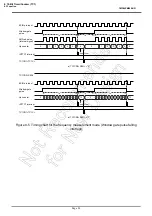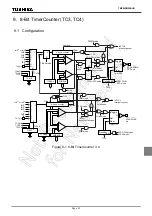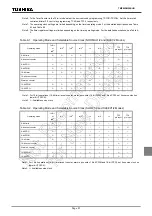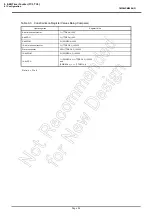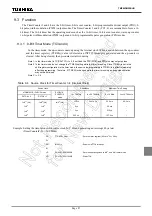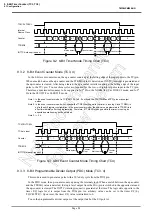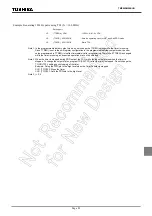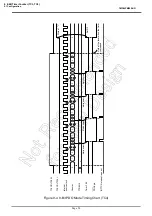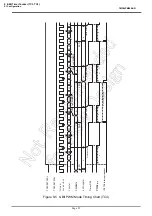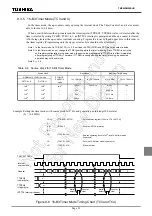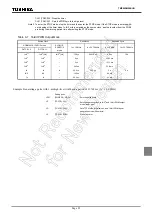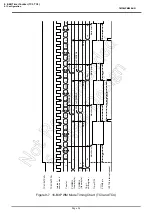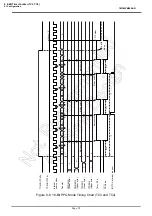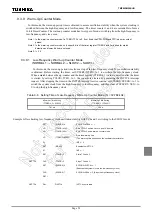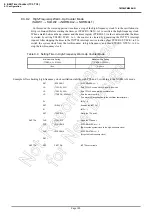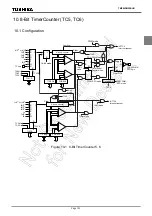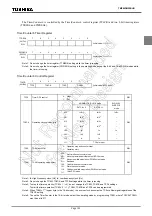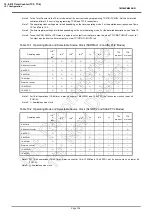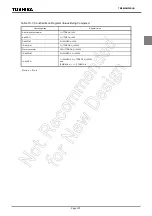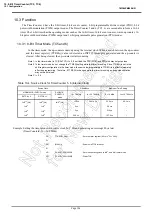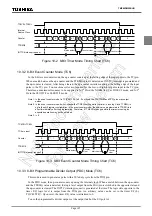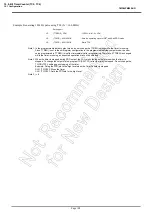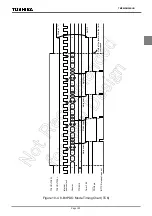
Page 94
9. 8-Bit TimerCounter (TC3, TC4)
9.1 Configuration
TMP86PM29BUG
9.3.6
16-Bit Event Counter Mode (TC3 and 4)
9.3.7
16-Bit Pulse Width Modulation (PWM) Output Mode (TC3 and 4)
This mode is used to generate a pulse-width modulated (PWM) signals with up to 16 bits of resolution. The
TimerCounter 3 and 4 are cascadable to form the 16-bit PWM signal generator.
The counter counts up using the internal clock or external clock.
When a match between the up-counter and the timer register (PWREG3, PWREG4) value is detected, the
logic level output from the timer F/F4 is switched to the opposite state. The counter continues counting. The
logic level output from the timer F/F4 is switched to the opposite state again by the counter overflow, and the
counter is cleared. The INTTC4 interrupt is generated at this time.
Two machine cycles are required for the high- or low-level pulse input to the TC3 pin. Therefore, a maxi-
mum frequency to be supplied is fc/2
4
Hz in the NORMAL1/2 or IDLE1/2 mode, and fs/2
4
to in the SLOW1/2
or SLEEP1/2 mode.
Since the initial value can be set to the timer F/F4 by TC4CR<TFF4>, positive and negative pulses can be
generated. Upon reset, the timer F/F4 is cleared to 0.
(The logic level output from the
PWM
4 pin is the opposite to the timer F/F4 logic level.)
Since PWREG4 and 3 in the PWM mode are serially connected to the shift register, the values set to
PWREG4 and 3 can be changed while the timer is running. The values set to PWREG4 and 3 during a run of
the timer are shifted by the INTTCj interrupt request and loaded into PWREG4 and 3. While the timer is
stopped, the values are shifted immediately after the programming of PWREG4 and 3. Set the lower byte
(PWREG3) and upper byte (PWREG4) in this order to program PWREG4 and 3. (Programming only the lower
or upper byte of the register should not be attempted.)
If executing the read instruction to PWREG4 and 3 during PWM output, the values set in the shift register is
read, but not the values set in PWREG4 and 3. Therefore, after writing to the PWREG4 and 3, reading data of
PWREG4 and 3 is previous value until INTTC4 is generated.
For the pin used for PWM output, the output latch of the I/O port must be set to 1.
Note 1: In the PWM mode, program the timer register PWREG4 and 3 immediately after the INTTC4 interrupt
request is generated (normally in the INTTC4 interrupt service routine.) If the programming of PWREGj and
the interrupt request occur at the same time, an unstable value is shifted, that may result in generation of
pulse different from the programmed value until the next INTTC4 interrupt request is generated.
Note 2: When the timer is stopped during PWM output, the
PWM
4 pin holds the output status when the timer is
stopped. To change the output status, program TC4CR<TFF4> after the timer is stopped. Do not program
TC4CR<TFF4> upon stopping of the timer.
Example: Fixing the
PWM
4 pin to the high level when the TimerCounter is stopped
In the event counter mode, the up-counter counts up at the falling edge to the TC3 pin. The TimerCounter 3
and 4 are cascadable to form a 16-bit event counter.
When a match between the up-counter and the timer register (TTREG3, TTREG4) value is detected after
the timer is started by setting TC4CR<TC4S> to 1, an INTTC4 interrupt is generated and the up-counter is
cleared.
After being cleared, the up-counter restarts counting at the falling edge of the input pulse to the TC3 pin.
Two machine cycles are required for the low- or high-level pulse input to the TC3 pin.
Therefore, a maximum frequency to be supplied is fc/2
4
Hz in the NORMAL1/2 or IDLE1/2 mode, and fs/
2
4
in the SLOW1/2 or SLEEP1/2 mode. Program the lower byte (TTREG3), and upper byte (TTREG4) in this
order in the timer register. (Programming only the upper or lower byte should not be attempted.)
Note 1:
Note 2:
Note 3:
In the event counter mode, fix TCjCR<TFFj> to 0. If not fixed, the
PDOj
,
PWMj
and
PPGj
pins may output pulses.
In the event counter mode, do not change the TTREGj setting while the timer is running. Since TTREGj is not in
the shift register configuration in the event counter mode, the new value programmed in TTREGj is in effect imme-
diately after the programming. Therefore, if TTREGj is changed while the timer is running, an expected operation
may not be obtained.
j = 3, 4
Содержание TLCS-870/C Series
Страница 1: ...8 Bit Microcontroller TLCS 870 C Series TMP86PM29BUG ...
Страница 6: ...TMP86PM29BUG ...
Страница 7: ...Revision History Date Revision 2007 10 11 1 First Release 2008 8 29 2 Contents Revised ...
Страница 9: ......
Страница 15: ...vi ...
Страница 19: ...Page 4 1 3 Block Diagram TMP86PM29BUG 1 3 Block Diagram Figure 1 2 Block Diagram ...
Страница 23: ...Page 8 1 4 Pin Names and Functions TMP86PM29BUG ...
Страница 48: ...Page 33 TMP86PM29BUG ...
Страница 49: ...Page 34 2 Operational Description 2 3 Reset Circuit TMP86PM29BUG ...
Страница 61: ...Page 46 3 Interrupt Control Circuit 3 8 External Interrupts TMP86PM29BUG ...
Страница 81: ...Page 66 6 Watchdog Timer WDT 6 3 Address Trap TMP86PM29BUG ...
Страница 135: ...Page 120 10 8 Bit TimerCounter TC5 TC6 10 1 Configuration TMP86PM29BUG ...
Страница 145: ...Page 130 11 Asynchronous Serial interface UART 11 9 Status Flag TMP86PM29BUG ...
Страница 165: ...Page 150 13 10 bit AD Converter ADC 13 6 Precautions about AD Converter TMP86PM29BUG ...
Страница 183: ...Page 168 15 LCD Driver 15 4 Control Method of LCD Driver TMP86PM29BUG ...
Страница 201: ...Page 186 18 Electrical Characteristics 18 9 Handling Precaution TMP86PM29BUG ...
Страница 203: ...Page 188 19 Package Dimensions TMP86PM29BUG ...
Страница 205: ......

